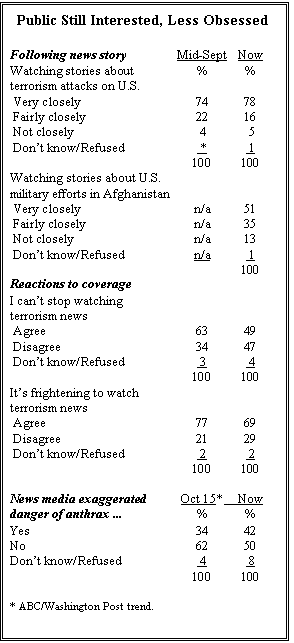Introduction and Summary

As reports of anthrax attacks dominate the media, the public is paying far greater attention to news of terrorism at home than to the war in Afghanistan. Interest in terrorist attacks is now running as high as during the early days after Sept. 11 – fully 78% are following news of terrorism very closely. By contrast, just 51% are tracking the U.S. military efforts in Afghanistan very closely, well below the 67% who paid very close attention to the early stages of the war in the Gulf.
Despite the large audience following the anthrax outbreak, a growing number of Americans feel the media is exaggerating the dangers posed by the disease. Better than four-in-ten (42%) say news organizations are exaggerating the risk, while 50% disagree. In an ABC News/Washington Post poll conducted Oct. 15, fewer people (34%) saw the media overhyping the anthrax risk, while 62% said coverage did not exaggerate dangers.
The latest Pew Research Center survey of 404 Americans, conducted Oct. 17-21, finds that people are gradually becoming less addicted to the media’s coverage of terrorism – 49% say they can’t stop watching news about terrorism, down from 63% in mid-September (Sept. 13-17). But they remain almost as fearful over what they are seeing.
About seven-in-ten (69%) say they are frightened by the coverage of terrorism, compared with 77% in mid-September.




